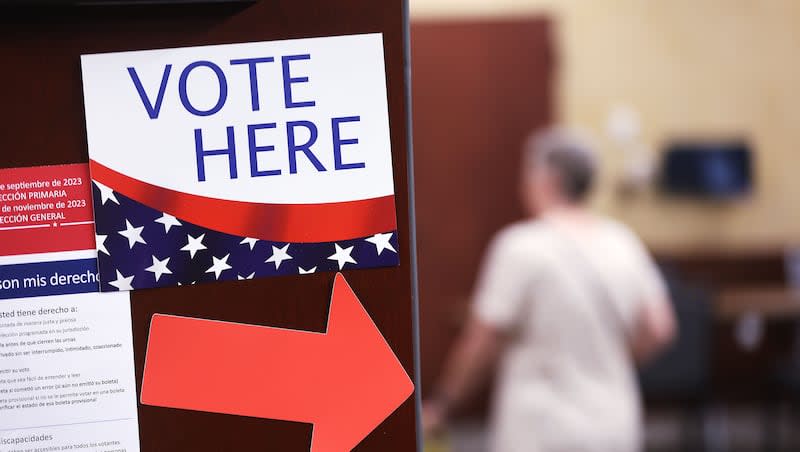Opinion: Here’s why you should trust in our elections

- Oops!Something went wrong.Please try again later.
A republic in which the people lose faith in the election process is not much of a republic at all. That distrust quickly may spread to institutions and laws, resulting in chaos or rebellion.
Thankfully, a group of Republican officials from various states are banding together to spread the word that is desperately needed this year — American elections are sound and reliable. Scott Warren, the leader of this program from the SNF Agora Institute at Johns Hopkins University and the center-right think tank R Street, presented this effort earlier this week at Utah Valley University with the help of the Sutherland Institute and the Gary R. Herbert Institute for Public Policy. It included endorsement from Utah Lt. Gov. Deidre Henderson and former Gov. Herbert.
As The Associated Press reported recently, the group has held meetings in several states, and plans to hold more before the election on Nov. 5. Utah is unique in that its political leaders are both conservative and at the forefront of this nationwide initiative to restore confidence in the nation’s electoral process.
Their message, reinforced by a complete review of court cases and audits after the 2020 election that, in the words of a report compiled by several prominent conservatives, led to an “unequivocal” conclusion that claims of election fraud are without evidence and Americans should be confident that every vote counts.
That message is needed. The AP report cited a poll last year by The Associated Press-NORC Center for Public Affairs Research, which found that only 22% of Republicans nationwide had confidence that all votes would be counted correctly in ‘24.
The results of opinion polls that were shared at UVU show Utahns suffer from many of the same misgivings, particularly those who self-identify as conservatives and who do not believe Joe Biden legitimately won the 2020 election. However, a Sutherland Institute poll conducted by Y2 Analytics in February found more than 70% of Utahns are confident the state’s vote-by-mail system results in accurate, fair and secure elections.
Henderson told us it’s important for Utahns to understand that American elections are being run correctly everywhere, not just here.
“You can’t say I don’t know what they’re doing in Rhode Island but here we’re doing well,” she said. “You can’t build public trust by undermining public trust.”
Part of that trust is understanding the unique and diverse election system in the United States — one that emanates from local governments upward, rather than from Washington down.
Henderson notes that no two states are exactly alike when it comes to election laws, systems and equipment. And in nearly every state, elections are handled at the local level — usually in counties — not at the state level. This is a strength and a guard against mischief. Even though humans are prone to errors, the wide diversity of election systems (the United States contains 3,143 counties or equivalents) makes it virtually impossible to rig an election in a meaningful way.
And yet, Henderson is concerned that 20 of Utah’s 29 county clerks, who administer elections, have quit since 2020. Many left because of constant skepticism and harassment from members of the public, goaded by political leaders who propagate baseless allegations of fraud.
This has been as unnecessary as it is appalling.
“The problem is there are some politically motivated individuals who are incentivized to spread fear and misinformation and mistrust because it will score them political points,” Henderson said. But that tactic can quickly backfire as fellow party members, convinced the system has failed, refuse to participate or vote.
One of the group’s guiding principles is that Republican officials should “publicly affirm the security and integrity of elections across the U.S. and avoid actively fueling doubt about elections in other jurisdictions.” That can be difficult for party members as former President Donald Trump, the party’s presumptive nominee again this year, continues to maintain he lost the 2020 election due to fraud.
In the future, historians are likely to be puzzled by this era’s mistrust in elections despite overwhelming evidence to the contrary. We hope they aren’t also writing about the nation’s downfall being caused by an evaporating sense of confidence in its most important democratic function.
Part of the antidote to that may be what Henderson emphatically told us Utahns ought to do as Election Day approaches.
“People need to commit right now to support the outcome of this November’s election,” she said. “Right now! People need to commit themselves, even if the other guy wins.”
While Americans should always remain vigilant against fraud, they cannot afford to persistently insist that it exists against all evidence.

